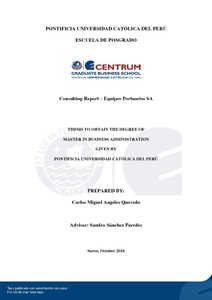| dc.contributor.advisor | Sánchez Paredes, Sandro Alberto | |
| dc.contributor.author | Angeles Quevedo, Carlos Miguel | es_ES |
| dc.date.accessioned | 2017-03-27T23:58:52Z | |
| dc.date.available | 2017-03-27T23:58:52Z | |
| dc.date.created | 2016 | |
| dc.date.issued | 2017-03-27 | |
| dc.identifier.uri | http://hdl.handle.net/20.500.12404/8293 | |
| dc.description.abstract | Equiports es una empresa familiar creada en 2007 que se especializa en el alquiler,
venta y post-venta de equipos de manipulación de contenedores para la industria portuaria
peruana. Esta industria es altamente competitiva, siendo muy importante para la distribución
exclusiva de marcas extranjeras tanto la relación con los clientes como la alta especialización
técnica.
El principal problema identificado dentro de la empresa es que Alejandro Sarria, el
Gerente General y cofundador de Equiports, pronto tendrá que dejar su puesto como CEO
con el fin de centrarse en otra empresa familiar. Sin embargo, como resultado del análisis
realizado, hay retos internos que podrían poner en peligro el éxito de la empresa en el futuro.
El problema se debe debido al alto grado de importancia que Alejandro ha tenido en
Equiports. Como pequeña empresa, Equiports no ha desarrollado una adecuada gestión del
conocimiento, y al ser una empresa familiar, no desarrolló un plan de sucesión que prepare
talento interno para que pueda reemplazarlo cuando sea necesario.
Se realizó un proceso de solución de problemas para asegurar que la empresa no
perderá competitividad sin la presencia de su líder central, Alejandro. Se propone un plan de
seis meses a ser implementado en Equiports para hacer frente al problema principal. El plan
posee cuatro iniciativas: (a) desarrollar capacitación, (b) revisar los KPIs, (c) desarrollar una
herramienta de gestión de recursos, y (d) mejorar la gestión del conocimiento. Este plan de
sucesión para la posición de CEO puede ser adaptado con menores cambios para cualquier
sucesión que la empresa tenga en el futuro | es_ES |
| dc.description.abstract | Equiports was created in 2007 as a family-owned company that specializes in the
rental, sales and after-sales of container handling equipment for the Peruvian port industry.
The company plays in a high competitive industry in which both the relationship with
customers and a highly technical experience are important to represent exclusively foreigner
brands.
The key problem identified within the company is that Alejandro Sarria, the General
Manager and co-owner at Equiports, will soon need to leave his position as CEO at Equiports
in order to be focused on another family-owned company. However, as a result of the
conducted analysis, there are internal issues that could jeopardize the success of the company
in the future. The firm is facing this challenge due to the degree of importance that Alejandro
has had in Equiports. As a small company, Equiports did not understand the need to develop
proper knowledge management, and being a family-owned company, it failed to develop a
succession plan and groom internal talent that could replace the CEO position when needed.
A problem-solving process was conducted to ensure that the firm will not struggle
without the presence of its central and ever present leader, Alejandro. A six months plan is
recommended to apply at Equiports to cope with the key problem. The plan has four
initiatives: (a) to develop training and shadowing, (b) to review the KPIs, (c) to develop a
resource management tool, and (d) to improve knowledge management. This
implementation plan for the succession of CEO position can be adapted with minor
alterations for any succession the company has in the future | es_ES |
| dc.language.iso | eng | es_ES |
| dc.publisher | Pontificia Universidad Católica del Perú | es_ES |
| dc.rights | info:eu-repo/semantics/openAccess | es_ES |
| dc.rights.uri | http://creativecommons.org/licenses/by-nc-nd/2.5/pe/ | * |
| dc.subject | Empresas familiares | es_ES |
| dc.title | Consulting report – Equipos Portuarios SA | es_ES |
| dc.type | info:eu-repo/semantics/masterThesis | es_ES |
| thesis.degree.name | Maestro en Administración de Negocios | es_ES |
| thesis.degree.level | Maestría | es_ES |
| thesis.degree.grantor | Pontificia Universidad Católica del Perú. CENTRUM | es_ES |
| thesis.degree.discipline | Administración de Negocios | es_ES |
| renati.advisor.dni | 09542193 | |
| renati.advisor.orcid | https://orcid.org/0000-0002-6155-8556 | es_ES |
| renati.discipline | 413207 | es_ES |
| renati.level | https://purl.org/pe-repo/renati/level#maestro | es_ES |
| renati.type | https://purl.org/pe-repo/renati/type#tesis | es_ES |
| dc.publisher.country | PE | es_ES |
| dc.subject.ocde | https://purl.org/pe-repo/ocde/ford#5.02.04 | es_ES |






